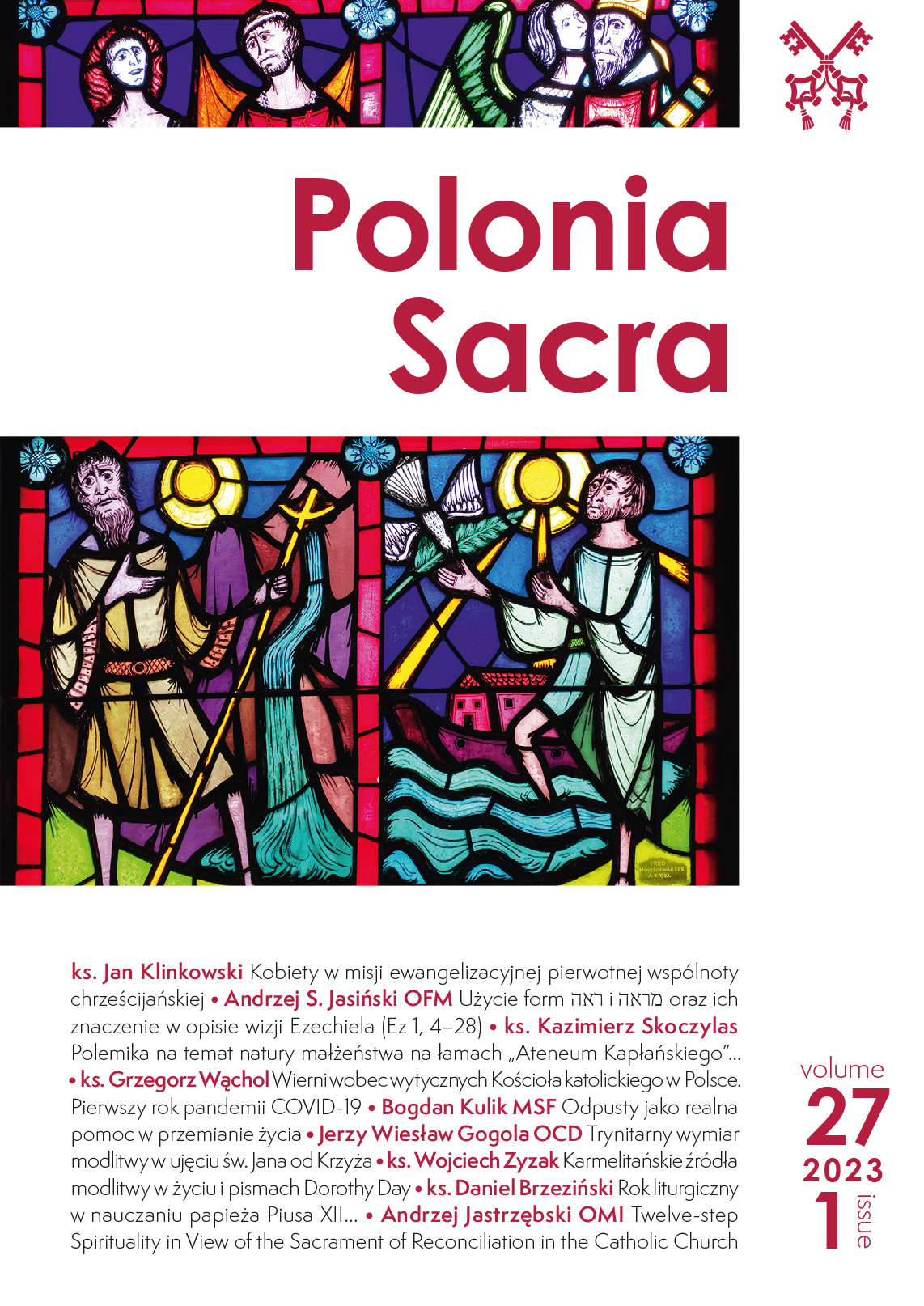Twelve-step Spirituality in View of the Sacrament of Reconciliation in the Catholic Church
DOI:
https://doi.org/10.15633/ps.27109Keywords:
confession, twelve-step programs, addictions, sacrament of reconciliationAbstract
This article ventures into the basic principles of the original Twelve-step program by studying its similarity with the dynamics of the Sacrament of Reconciliation in the Catholic Church. It begins with a short presentation of the theological foundation of confession, and continues with the history of AA’s Twelve-step recovery program while focusing on the latter’s spiritual dimension and that of similar groups. The major analysis is dedicated to demonstrating and discussing the parallels found in the twelve steps content and the Sacrament of Reconciliation; where the twelve steps have their effectiveness written within themselves, the Sacrament of Reconciliation also requires a progression from contrition, an examination of conscience, the confessing sins and satisfaction. In conclusion, the author presents pastoral suggestions meant to facilitate work with believers struggling with various addictions.
References
Alcoholics Anonymous World Services, A. A. Fact File, New York 2018, https://orangenyaa.org/wp-content/uploads/2018/10/aa_fact_file.pdf (22.09.2022).
Alcoholics Anonymous, Alcoholics Anonymous (3rd ed.), New York 1976.
Alcoholics Anonymous, Twelve Steps and Twelve Traditions, New York 1981.
Borkman T., The Twelve-Step Recovery Model of AA: A Voluntary Mutual Help Association, “Recent Developments in Alcoholism” 2008, p. 9–35, https://doi.org/10.1007/978-0-387-77725-2_2.
Bullitt-Jonas M., Climate Change, Addiction, and Spiritual Liberation, “Religions” 12 (2021) nr 709, p. 1–15, https://doi.org/10.3390/rel12090709.
Cheever S., My name is Bill: Bill Wilson—His life and the creation of Alcoholics Anonymous, New York 2004.
Connors G. J., Walitzer K. S., Tonigan J. S., Spiritual Change in Recovery, “Recent Developments in Alcoholism” 2008, p. 209–27, https://doi.org/10.1007/978-0-387-77725-2_12.
Denzin, N., Interpretative Biography, London 1989.
Dermatis H., Galanter M., The Role of Twelve-Step-Related Spirituality in Addiction Recovery, “Journal of Religion and Health” 55 (2016) nr 2, p. 510–521, https://doi.org/10.1007/s10943-015-0019-4.
Dossett W., Addiction, Spirituality and 12-Step Programmes, “International Social Work” 56 (2013) nr 3, p. 369–83, https://doi.org/10.1177/0020872813475689.
Galanter M., Spirituality and Recovery in 12-Step Programs: An Empirical Model, “Journal of Substance Abuse Treatment” 33 (2007) nr 3, p. 265–72, https://doi.org/10.1016/j.jsat.2007.04.016.
Gross M., Alcoholics Anonymous: Still Sober After 75 Years, “American Journal of Public Health” 100 (2010) nr 12, p. 2361–2363, https://doi.org/10.2105/AJPH.2010.199349.
Hänninen V., Koski‐Jännes A., Narratives of recovery from addictive behaviours, “Addiction” 94 (1999), p. 1837–1848, https://doi.org/10.1046/j.1360-0443.1999.941218379.x
Hart K. E., A spiritual interpretation of the 12-steps of Alcoholics Anonymous: From resentment to forgiveness to love, “Journal of Ministry in Addiction & Recovery” 6 (1999) nr 2, p. 25–39.
Hathaway D. B., Dawes M., Addiction and Twelve-Step Spirituality, in: Christianity and Psychiatry, eds. J. R. Peteet, H. S. Moffic, A. Hankir, H. G. Koenig, Cham 2021, p. 147–162, https://doi.org/10.1007/978-3-030-80854-9_11.
Kaskutas L. A., Ammon L., Delucchi K., Room R., Bond J., Weisner C., Alcoholics Anonymous Careers: Patterns of AA Involvement Five Years after Treatment Entry, “Alcoholism, Clinical and Experimental Research” 29 (2005) nr 11, p. 1983–1990, https://doi.org/10.1097/01.alc.0000187156.88588.de.
Kelly J., White W., Broadening the Base of Addiction Mutual-Help Organizations, “Journal of Groups in Addiction & Recovery” 7 (2012) nr 2–4, p. 82–101.
Kelly J. F., Humphreys K., Ferri M., Alcoholics Anonymous and Other 12‐step Programs for Alcohol Use Disorder, “Cochrane Database of Systematic Reviews” nr(2020) nr 9, https://doi.org/10.1002/14651858.CD012880.pub2.
Kelly J. F., Is Alcoholics Anonymous religious, spiritual, neither? Findings from 25 years of mechanisms of behavior change research, “Addiction” 112 (2017), p. 929–936.
Khantzian E. J., Mack J. E., Alcoholics Anonymous and contemporary psychodynamic theory, in: Recent developments in alcoholism, 7: Growth and Transformation in Workplace Alcoholism Programming, ed. M. Galanter, New York 1994, p. 68–89.
McMinn M. R., Psychology, Theology, and Spirituality in Christian Counseling, Carol Stream 2011.
McMinn M. R., Sin and Grace in Christian Counseling: An Integrative Paradigm, Downers Grove 2008.
Moos R. H., How and Why Twelve-Step Self-Help Groups Are Effective, “Recent Developments in Alcoholism” 2008, p. 393–412, https://doi.org/10.1007/978-0-387-77725-2_22.
Perrin D. B., The Sacrament of Reconciliation. An Existential Approach, Lewiston 1998.
Rodriguez-Morales L., ‘That’s the Spiritual Side of Me’: Men’s Autobiographical Accounts of Recovery in Twelve Step Fellowships, “Implicit Religion” 22 (2020) nr 2161–2183, https://doi.org/10.1558/imre.38499.
Stafford T., The Hidden Gospel of the 12 Steps, “Christianity Today (Washington)” 35 (1991) nr 8, p. 14–19.
Swora M. G., The rhetoric of transformation in the healing of alcoholism: The twelve steps of Alcoholics Anonymous, “Mental Health, Religion & Culture” 7 (2004), p. 187–209. https://doi.org/10.1080/13674670310001602445.
Downloads
Published
Issue
Section
License

This work is licensed under a Creative Commons Attribution 4.0 International License.
Authors who publish in this journal agree to the following terms:
- Authors retain the copyright and full publishing rights without restrictions and grant the journal right of first publication with the work simultaneously licensed under a Creative Commons Attribution 4.0 International License that allows others to share the work with an acknowledgement of the work's authorship and initial publication in this journal.
- Authors are able to enter into separate, additional contractual arrangements for the non-exclusive distribution of the journal's published version of the work (e.g., post it to an institutional repository or publish it in a book), with an acknowledgement of its initial publication in this journal.
- Authors are permitted and encouraged to post their work online (e.g., in institutional repositories or on their website) prior to and during the submission process, as this can lead to productive exchanges, as well as earlier and greater citation of published work (See The Effect of Open Access).

